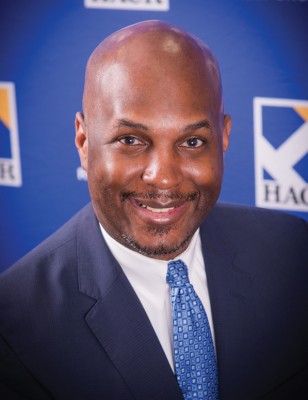The spotlight Carlos F. Orta recently stepped out of was a bright one. In his nearly eight-year tenure, the president and CEO of the Hispanic Association on Corporate Responsibility (HACR) doubled the organization’s revenue, added more than 20 corporate memberships, and designed several programs. After nearly six months of searching, the committee found a professional capable and worthy of succeeding him. Cid Wilson brings to HACR more than 20 years of Wall Street experience—he is a top equity analyst—multiple advisory board roles, and recognition by Forbes and Black Enterprise Magazine as an advocate for Afro-Latinos. Wilson, who traces his roots to Dominican-American parents in Washington Heights, NY, described his plans for HACR to HE.

How has your career prepared you for your role as president and CEO of HACR?
This position brings together my greatest strengths. Having worked on Wall Street for two decades, I understand the language of corporate business. Because I’ve served on two corporate advisory boards (PepsiCo and Verizon), I understand them from the inside. I’m combining that background with the mission of HACR, which is to advocate for the inclusion of Latinos in corporations within the C-suite and on the boards of the nation’s largest companies.
Expand on HACR’s big-picture mission?
We’re really advocating for the boards and executive populations of corporations to have diversity that mirrors the buying power and presence of Latinos in the United States. We have well over $1 trillion in buying power. Currently, the diversity of major corporations doesn’t mirror the diversity of the nation, especially on their boards of directors.
What is your first priority at HACR?
My top priority is to lead the effort to involve more Latinos at the C-suite level. To do that, we must expand our reach among Fortune 500 companies. We also need to produce a solid pool of Latino candidates to fill corporate positions. We need to have a multipronged approach to accomplish that mission.
What needs to happen to make those goals possible?
In the short term, we need to start building connections with corporations. In the long term, we need to have educational programs to build the pool of future board members and executives. We want to salute the companies working for diversity, and we want to demonstrate to other companies the ways in which HACR can help them grow diversity efforts. This is particularly true in industries with a heavy presence of Latino consumers, such as retail-oriented industries and businesses in geographic locations with a high concentration of Latinos.
How do you plan to expand HACR’s influence in Fortune 500 companies?
We need to make initial contact with companies we haven’t reached before. Sometimes that contact is direct, and other times it comes through one of our current partners. What matters is that we get in.
What happens once you’re in?
We also need to expand our existing programs to continue developing more Latinos who are ready to serve on boards and in C-suite positions. That requires working with people who have already reached a certain level of achievement.
What advantages does HACR already possess to make that possible?
We’re not reinventing the wheel. I think we have some great success stories that we can use as models for the next class of potential Latino board members.
In 2013, HACR conducted a study that emphasized the growing importance of employee resource groups (ERGs). Describe the ERG business advantage.
Employee resource groups are critical to meeting business goals. They are often the ambassadors of the company. Employees are involved in their communities, and they can identify opportunities for the company to participate in ways that the leaders might not have identified on their own. It’s a win-win-win for the employees, the company, and the community. ERGs achieve multiple goals. They improve retention, which improves productivity, which improves profitability. They also ensure there is a group within the company that can address concerns and challenges and offer solutions in a way that considers the company’s internal structure. That ranges from writing marketing strategies that are consistent with Latino culture to recognizing holidays that are important to different Latino
employees.
Will this knowledge impact HACR’s future work?
Absolutely. ERGs are often the pipeline for Latinos to serve in the C-suite and on boards. ERGs also serve as the internal advocates that allow HACR to fulfill our mission. We’ll be reaching out to these groups because we need their voice to advocate internally the message we’re broadcasting nationally.

